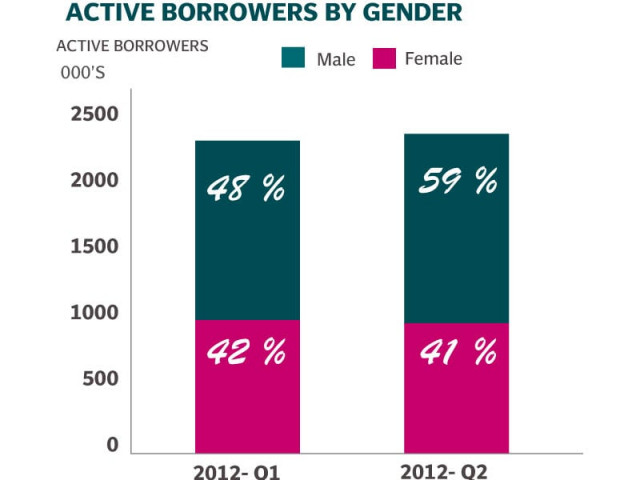The glass wall: How effective is microfinance outreach to women borrowers?
Microfinance loans are largely unavailable to unmarried women who are considered high-risk borrowers.

The glass wall: How effective is microfinance outreach to women borrowers?
It is an undeniable fact that fostering female entrepreneurship is important for Pakistan’s economic growth and access to financial services is an important component of starting and growing a business. Most women‐owned businesses are small, household‐based cottage industries so microfinance products should be a natural source of start‐up and working capital finance for this clientele. But that isn’t the case.
Microfinance portfolio data accumulated by the Pakistan Microfinance Network (PMN) also suggests that although Pakistan’s microfinance sector has shown improvements in reaching women, it still lags its regional peers—only 59% of microfinance clients are women.
A worrying aspect of the local demographic is that often, a woman may apply for microfinance but the money is acquired by a male member or members of the family. The potentially widespread practice of women borrowers acting as conduits for loans passed on to other beneficiaries defeats the purpose of the loan. Often men who can’t borrow because of a bad loan or credit history, or simply need more finances use women to get access to the financial system.
Even conservative estimates based on a recent World Bank (WB) report suggest that between 50% to 70% of microloans to women in Pakistan may actually be used by their male relatives. By some estimates only 25% of the actual finance is utilised by women.
And it really doesn’t need to be stated that even though they may not be the ones benefitting from the loans, women borrowers are still responsible for paying them back.
Most women engage in traditional businesses. The most common activity for women is the textile sector, which includes embroidery and embellishment work, boutiques, home textiles such as cushion covers and bedspreads, and knitting. Other common sectors for women entrepreneurs include tailoring, operating retail shops, and livestock (including dairy). Some women are beginning to diversify into relatively non-traditional sectors such as photography, manufacturing of crockery, and leather goods, but these remain on the margin. Women still prefer to engage in activities that require little mobility and minimal interaction with men and allow them to generate income through applying existing skills.
While access to appropriate finance remains the single biggest challenge cited by women in setting up their businesses this is closely followed by the lack of market exposure and access to information, permission from one’s family, limited mobility, and risk of failure.
According to the WB report a number of women believe that the conservative culture limits their mobility. Some women who are starting a business are reluctant to approach MFPs for loans due to the risk of business failure. They fear the consequences of the inability to pay back the loans: “We are afraid that if we don’t pay the installment, [MFP staff] will come to our homes,” the report quoted a woman entrepreneur in Gujranwala.
“Access to finance remains one of the biggest challenges for Pakistani women who want to start and grow a business,” says Rachid Benmessaoud, World Bank Country Director for Pakistan. “Strict guarantor requirements and the practice of offering business loan products exclusively to men have only widened the gap between Pakistani businesswomen and the microfinance sector.”
Unless there is a dramatic shift in the regulatory policy microfinance loans for businesses will stay largely unavailable to women entrepreneurs, especially unmarried women who are considered high-risk borrowers. Microfinance providers enforce strict requirements that make it difficult for businesswomen to secure loans without men. According to the WB report, nearly 68% of women borrowers required a male relative’s permission in order to qualify for any kind of loan. One fails to see any real empowerment here.
In addition, nearly all microfinance providers require clients to provide two male guarantors in order to access a business loan - and at least one of the guarantors should be unrelated to the borrower. In what is still a conservative society, finding unrelated male guarantors can be a challenge for Pakistani women micro entrepreneurs who, as already stated are often constrained by limited mobility and social barriers.
Microfinance providers do not accept women guarantors for these loans, which is sad. I once spoke to Akram Khatoon, in her capacity as the founding president of First Women Bank, who said at the time, that one of the main reasons that the bank had a remarkable loan recovery record was because she believed women were more honest about repaying their debts. Isn’t it about time they get the benefit of this?
Published in The Express Tribune, November 12th, 2012.


















COMMENTS
Comments are moderated and generally will be posted if they are on-topic and not abusive.
For more information, please see our Comments FAQ